
Julie Benko is having a moment. Make that several.
The fate of Broadway’s highly-anticipated Funny Girl has been more tumultuous than the COVID-era stock market. Ups (it’s happening!), downs (the initial reviews), and then the ultimate wtf moment — Beanie Feldstein’s sudden departure. Amid the mishigas was at least one constant: the stand-by.
Benko stepped in when the actress fell ill, and upon Feldstein’s early departure, she continued playing the role through the remainder of the summer, creating an undercurrent of excitement among theatergoers craving a Fanny Brice who could belt like Barbra.
And while much of the focus has now shifted to Lea Michele‘s chance to take the reigns, Benko has uncompromisingly established herself as one of Broadway’s newest leading ladies. Queerty caught up with Benko upon the release of her second album, Hand in Hand, with husband Jason Yeager.
How about we take this to the next level?
Our newsletter is like a refreshing cocktail (or mocktail) of LGBTQ+ entertainment and pop culture, served up with a side of eye-candy.
Hi, Julie! Thanks for taking some time with Queerty. It’s not like you’ve been busy starring in Funny Girl on Broadway or releasing a new album, right?
Right. August was definitely not the craziest month of my life. Who are you, again? What day is it? Am I wearing underwear?

First things first. I had more than one Steel Magnolias “laughter through tears is my favorite emotion” moment during your Funny Girl performance, which is simultaneously hilarious and heartbreaking. Were you a dramatic child?
I punted this question to my parents. My dad said, “When you were about three when we went to a restaurant, you used to go around to all the tables hugging and kissing the other patrons.” My mom added, “You hated to leave a party or a friend’s house and had to be carried out screaming.” So… I would say I was pretty characterless. And, obviously, painfully shy.
You earned both your B.F.A. and Master’s degree at NYU. Did you get to see a lot of theater while you were in school?
Yes! New York’s theater scene is the reason I live here and will probably never leave. I try to see whatever I can, not only on Broadway but Off–Broadway and downtown too.
Were there any stand-out performances or shows you remember?
Tribes by Nina Raine at the Barrow Street Theater. That play is one of the most moving pieces of theater I’ve ever seen, and David Cromer is a genius. (I’m obsessed with everything he’s ever directed.)
I recall seeing the revival of Ragtime — I was sobbing so loudly in the finale I was pretty sure the cast must have complained about me backstage after the show. And two Emma Rice-directed productions that came over from Kneehigh Theatre, The Wild Bride at St. Ann’s Warehouse and Brief Encounter on Broadway, continue to inspire me deeply about what is possible in the theater. Those works combined music, media, and devised theater practices with magnificently imaginative design and powerful storytelling. I wish I could watch them over and over again. There have been so many standout productions and performances I’ve been lucky to witness over the years. I could go on and on, but you don’t have the space.
And did you ever wonder, like Fanny, if you were “a bagel on a plate full of onion rolls”?
Yes. In the musical theater world, there is this idea of fitting into a “type.” The ingenue, the funny sidekick, the leading man, and so on. From the age of 18, I was told that, in order to play the ingenue, I’d have to lose 10 or 15 pounds or I’d remain “between types.” Around that time, an agent I met with told me that my face was “too round for television.” I carried a lot of those comments around with me over the years, trying to fit into the image of what I thought the industry demanded.
In grad school, I discussed this with one of my mentors, the fabulous actor-director Brandon Dirden. He asked me to list some of my favorite actors. I rattled off some of my favorites: Tony Shalhoub, Merritt Wever, Laura Linney, Jessie Meuller. He remarked that none of those people fit into a “type,” and noted that the very reason I admired them so deeply was that they could not be confined to any “type” at all. That was a big moment for me. And playing Fanny has allowed me to really live that. I get to celebrate all of my bagel-ness and bring my complete self to the character.

This is actually your third Broadway show, having previously appeared in revivals of Les Misérables and Fiddler on the Roof, the latter in which you understudied six different roles, which sounds like a nightmare, but a gig is a gig, right?
It was actually eight different roles! The hardest part is in the beginning when everything is constantly in flux. But once the show is “frozen” and you’ve finally learned all your roles, it is actually pretty fun. You don’t get bored doing the same thing eight times a week for months and years on end. You are constantly switching parts and seeing the show from different angles. It keeps it interesting.
Did you ever have to play two of the daughters in the same performance?
No, but there were days when I played multiple villagers at once. But there were enough covers in the building to ensure that Tevye always had his five daughters.
Your experience as Funny Girl has been a bit different, as you were originally cast as a standby. It may sound obvious, but for theater newbies, what does that mean?
A standby is an actor whose sole job is to understudy a lead role. I had to be backstage at the theater for every show, for the entire show, just in case something happened, and they needed me to step in. My title will change when Lea Michele starts on September 6. I’ll become an “alternate,” which means I’ll have a guaranteed weekly performance schedule but will continue to be on–call backstage to step in for an emergency.
You performed the role full-time during the interim. What have you learned about Fanny since you’ve got your arms fully wrapped around the character?
So much. One thing, in particular, I’ve been able to sink deeper into is that “haimishe” (Yiddish for “familiar, comfortable”) feeling with the audience. The real Fanny [Brice] had a very deep, electric connection with her audiences. When I was just starting out in the role, I had to stay so focused on not messing up that I couldn’t always completely take in the crowd. But they are an important character in the show. The audience is literally Fanny’s best friend and confidante. I feel like I’m able to connect with them and include them on the journey in a much deeper way now than when I was just beginning. It’s especially fun when I get to break the fourth wall in the show-within-a-show numbers, but I’ve found other moments to reach across the footlights when I’m within the more traditional story as well.
This production delivers a love interest with washboard abs by way of Ramin Karimloo as Nick Arnstein, so I understand the appeal. But part of me wanted to stand up and scream, “wash that man right out of your hair!” The real-life Arnstein was a notorious gambler and crook. As an actress, how do you reconcile Fanny’s choice to stay with such a deadbeat?

As a feminist, it can be difficult. This is not the kind of relationship we want for ourselves or our loved ones. If Fanny were my friend, I would tell her to run for the hills! But as an actress, it’s also my job to portray what real life can be and what real relationships can look like, and that is often far from ideal. For all of Fanny’s confidence in her talent, she has still spent her entire life being told she isn’t pretty. I think she’s internalized that as not being worthy of love. So when someone like Nick gives her attention, it’s like a drug. How can she resist someone who makes her feel truly beautiful? Ultimately, though, Fanny does learn to love herself and to stand on her own two feet without him. So that makes the journey very rewarding.
Let’s talk real-life romance. Where did you meet your husband, Jason Yeager?
In a midtown Starbucks! I was killing time after an audition. He was killing time after coming in on Amtrak from teaching at Berklee in Boston. He had initially gone to the Starbucks across the street, but that one had no available tables. I was sitting next to him when I heard him on the phone doing an interview with a singer. “I’m a jazz pianist, and I play with lots of singers,” he said. I thought, “I should know this guy!” So I struck up a conversation with him. I wasn’t trying to hit on him, I swear. And now we’ve been together for almost a decade. Crazy. We truly feel like the “luckiest people in the world” to have found each other by such chance.
What was your favorite part of your wedding?
It’s hard to choose. The private ketubah signing ceremony was so moving and felt more like our wedding ceremony than the public one. (My uncle was the rabbi!) We also had the best band ever: the New Orleans–style funk band The Gotham Kings. People didn’t stop dancing all night long. The Hora was insane! One of our friends calls our wedding “one of the top three concerts I’ve ever been to.”

Have you been to a same-sex wedding?
Somehow, incredibly, no. I sort of can’t believe that as I say it. I have been invited to some, but I’ve had to miss them for work. One of the hardest things about being a performer is that you often end up missing major events in friends’ lives. I wish people would hold their weddings on Mondays, which is the typical day off for theater folks.
But I wrote the song “Tomorrow Is A Day For You,” which opens my first album, as a celebration of marriage equality back in 2015 after the Supreme Court recognized same-sex marriage as the law of the land. Maybe one day I’ll get to sing it at a friend’s same-sex wedding. That would be very full circle.
It sort of freaks me out when grooms wear identical suits like they’re twins. Is that creepy or is it just my fear of intimacy?
I’m an actor, not a therapist. I’m happy to provide you with some great names. They may not be in–network, though.
Back to you and Jason — so you’re not only in love, but you make lovely music together. I guess it’s natural, given your interests, but how did you decide to make an album together?
When the pandemic began, we started a weekly concert series via Faceboook/Instagram Live called “Quarantunes.” We’d play songs we knew and took requests from friends and family. At some point, Jason said, “We should record these!” So we picked our favorites and went into the studio.
Hand in Hand (Club44 Records) features a mix of jazz, Great American Songbook, and reimagined theater songs. Jason masters quite a few different keyboard instruments, but there’s a bit of knee-slapping (aka “body percussion”), too. Does that come naturally?
The knee-slapping comes naturally for Jason. For me, it’s more eye-rolling at his many terrible puns.

One of my favorite tracks is “People,” which is from Funny Girl but gets a very different treatment with an intimate piano arrangement. And I love a good back phrase!
Thank you! It was fun to work out our own arrangement that didn’t sound like typical musical theater. And I’m under strict orders from Funny Girl’s music director not to back phrase too much during the show. So I enjoy getting to do our version, where it feels good to be bad.
Another favorite is “Sweet Pea” about Billy Strayhorn, which has a gay backstory that most people may not be aware of.
Jason wrote “Sweet Pea” to celebrate Strayhorn’s 100th birthday back in 2015. Billy Strayhorn, who wrote many great songs often attributed to Duke Ellington such as “Take the A Train,” was a Black, openly gay pianist, composer, and civil rights activist living in NYC from the 1940s through the 1960s. Strayhorn is one of Jason’s musical heroes and, in fact, lived only a few blocks away from our Harlem apartment. Jason has become friends with Strayhorn’s family, who are constantly working to uphold and honor his legacy. We highly recommend checking out David Hajdu’s biography of Strayhorn, Lush Life.
“Theater is my home. I don’t know what my future holds in terms of new projects. But, like Fanny Brice, if a theater will have me, that’s where I’ll be.” — Julie Benko
When I win the lottery, I want to cast you in shows written by some of my favorite gay theater composers. Any roles in mind by…
Stephen Sondheim – I’m keeping my fingers crossed that the current revival of Into the Woods stays open long enough that I can eventually jump in as Cinderella or the Baker’s Wife. Can someone tell casting, please?
Kander & Ebb – Sally in Cabaret, obviously! I am r-e-a-d-y. Also, I’d love to do Flora the Red Menace sometime. Maybe we get New York City Center Encores! to do it?
William Finn – I played Olive in a regional production of The 25th Annual Putnam County Spelling Bee, which I’d love to do again. Eventually, I’d like to do Trina in Falsettos. “I’m Breaking Down” is so genius.
Jerry Herman – Mabel in Mack and Mabel, please! Also, I would love to sing the stunning “I Never Said I Love You” in Dear World at Encores! next season. I think those are the same casting people as Into the Woods so, really, somebody please get in touch with them for me.
Before I let you go, can you promise me that you won’t move to Hollywood before starring in another Broadway show?
Are you telling me that if a movie studio comes knocking on my door and asks me to star in the Funny Girl movie remake, you’re going to make me turn them down? But, in all seriousness, theater is my home. I don’t know what my future holds in terms of new projects. But, like Fanny Brice, if a theater will have me, that’s where I’ll be.
Julie Benko plays Fanny Brice on Thursday evenings beginning September 8. Hand in Hand is available to download and stream.


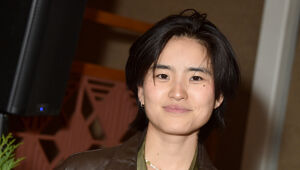
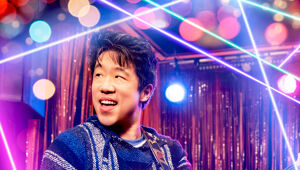
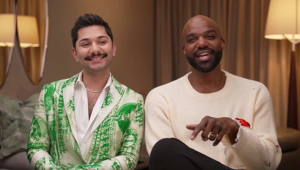
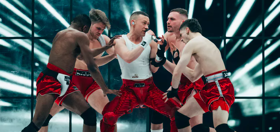


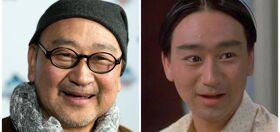


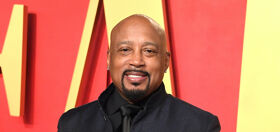
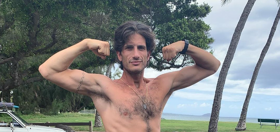
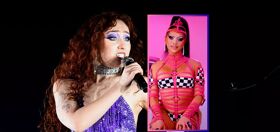


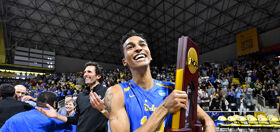

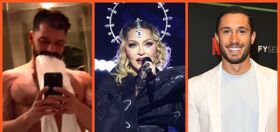
dbmcvey
This interview made me like her even more!
humble charlie
great interview!! i can’t wait to listen to her album, but i really wish i lived in new york so i could see her on broadway. she’s a real cutie-pie.
JTinToronto
Is there a pool going on how long Lea Michele will last before she gets the boot and they try to bring back Julie Benko?
Joshooeerr
Put me down for three weeks.
dbmcvey
I’m sure the cast and crew are already tired of her.